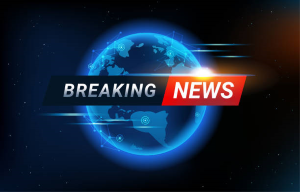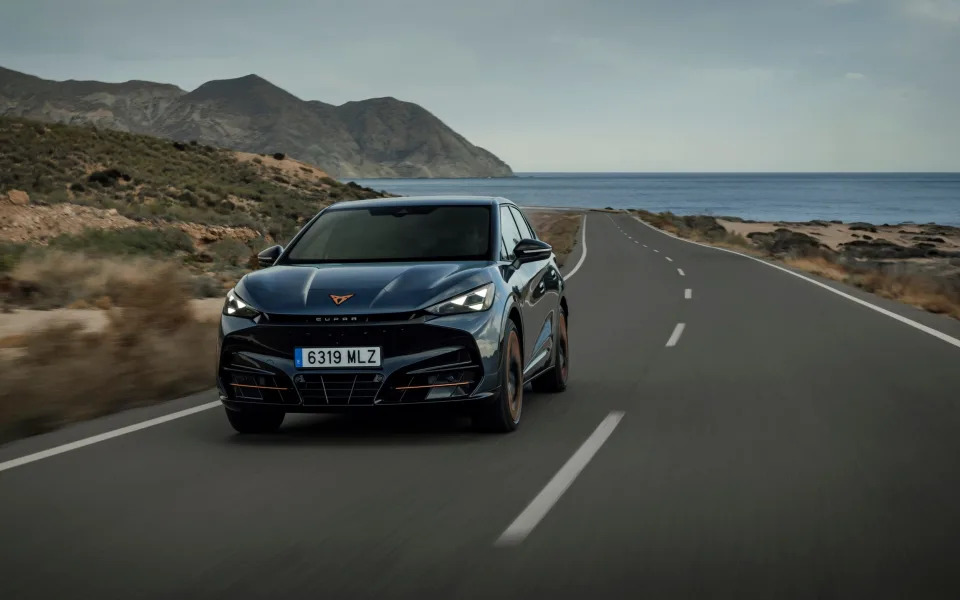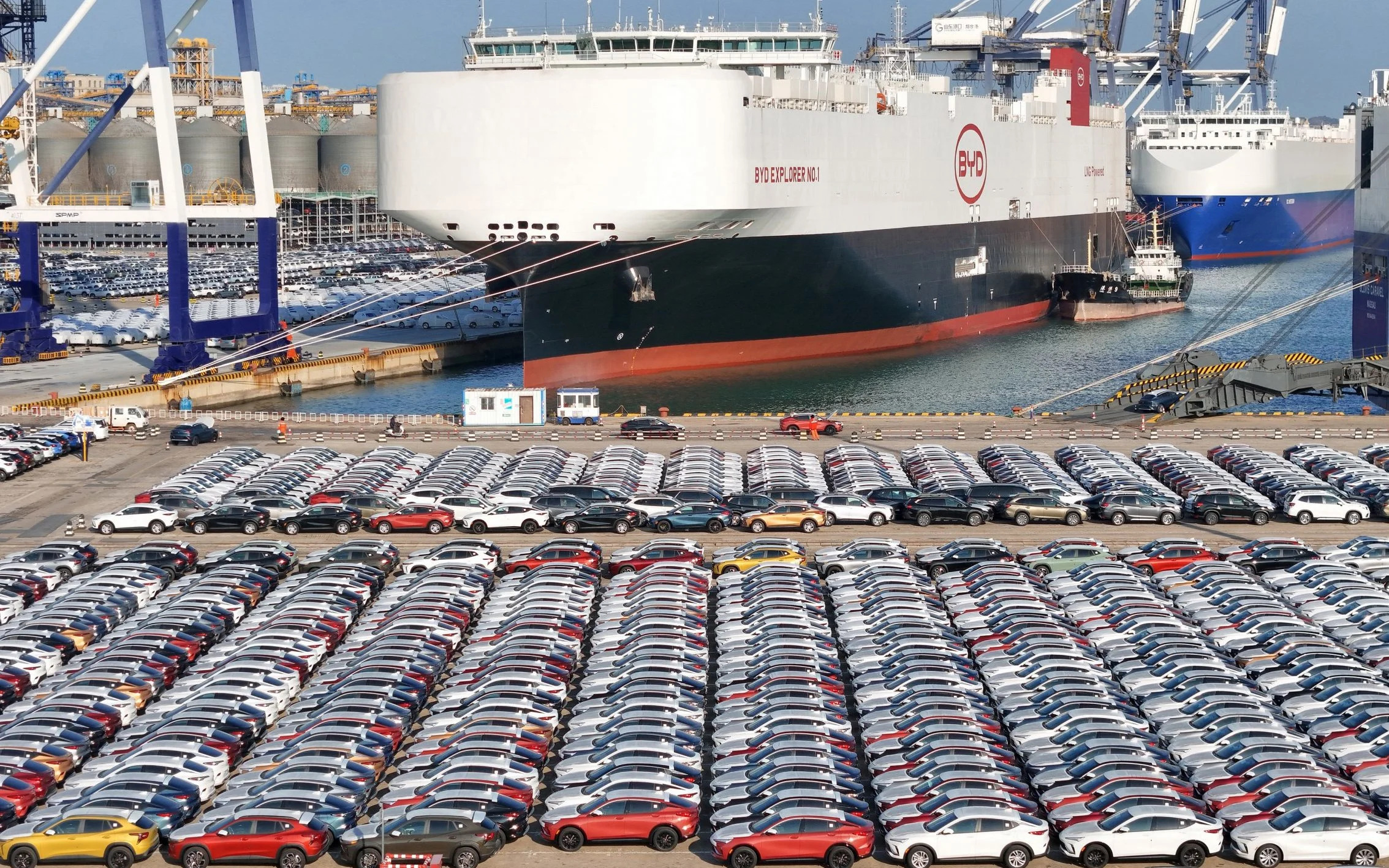Europe just slashed tariffs on cars made by Tesla in China

The European Union may have just given Tesla’s future sales in the region a boost by setting tariffs on its China-made vehicles considerably below those imposed on rival electric carmakers.
The high-profile decision comes two months after the EU hiked tariffs on all electric cars imported from China, citing “unfair” state subsidies that unduly benefited the country’s electric vehicle makers at the expense of European manufacturers.
Tesla, which has a factory near Berlin but exports many of the cars it makes in China to Europe, had requested that the EU recalculate its rate, initially set at 20.8%.
On Tuesday, the European Commission, the EU’s executive arm, set that rate at 9%.
That applies on top of the existing EU duty of 10% on all EV imports, but it is still well below the additional tariffs of between 17% and 36.3% levied on other Chinese automakers.
The European Commission said the tariff reflected the “level of subsidies” Tesla received in China.
“The Commission verified the information during (a) visit in China and conducted the same checks as of the other sampled Chinese exporting producers,” it added in a statement. CNN has contacted Tesla for comment.
Gregor Sebastian, a senior analyst at think tank Rhodium Group, said he was “surprised” that Tesla’s additional tariff had been set at “only 9%.” He pointed to local government loans that the company has received in Shanghai, as well as subsidized batteries from Chinese battery maker CATL.
“But it’s tricky to make a strong argument here without seeing all the inputs and methodology the Commission used,” he added.
The additional duty is “still negative” for Tesla, but could give the carmaker “some breathing room” relative to SAIC, currently its major competitor in Europe, he told CNN. “(SAIC) is really going to struggle.”
The Chinese state-owned carmaker, which owns the iconic MG car brand, has been hit with an additional 36.3% tariff, reserved for “non-cooperating companies,” according to the Commission.
Geely, which owns Sweden’s Volvo, has been hit with an additional 19.3% tariff. And cars made by BYD — which is vying with Tesla to be the world’s biggest seller of battery EVs — are subject to an additional duty rate of 17%.
These are slightly lower than the duties proposed in June following a more thorough investigation and input from the automakers, the Commission said.
Some Chinese companies in joint ventures with EU automakers may also benefit from lower duties, set at 21.3%, rather than automatically receiving the higher 36.3% rate.
China’s Commerce Ministry said on Tuesday that it “firmly opposes and is highly concerned” about the bloc’s ruling on EV tariffs, which followed an extensive probe into Chinese EVs. In a statement, the ministry said the investigation findings were “distorted” and vowed to “resolutely defend the legitimate rights and interests of Chinese companies.”
Tesla versus BYD
After the initial EU tariffs took effect in July, Tesla hiked the price of its Model 3 in Europe by about 4%, or €1,500 ($1,666), to €42,490 ($42,177), blaming the additional duties.
Still, the Model 3 remains cheaper than the BYD Seal, according to George Whitcombe, an automotive research analyst at consultancy Rho Motion. “Now, with Tesla’s additional tariff being reduced … it will help the Model 3 remain competitive with other Chinese-made EVs in Europe,” he told CNN.
BYD, for its part, has not yet raised prices in Europe despite the hefty additional tariff.
“BYD has a much better ability to absorb these additional duties because production costs are much lower compared to their prices in Europe,” said Sebastian of Rhodium Group. He estimates that BYD could absorb an additional EU tariff of up to 45%.
The company could also ramp up exports of plug-in hybrid electric vehicles, which Tesla doesn’t make, as the tariffs apply only to battery EVs. And in future, BYD could escape tariffs altogether by making cars in Turkey for the EU market. Imports from Turkey are not subject to tariffs.
Regardless of higher tariffs, Chinese EV makers are unlikely to give up on Europe, which accounted for more than a third of their exports last year, more than the next five largest markets combined, according to Citi.
Chinese automakers enjoy a “large margin” on their sales in Europe, said Whitcombe.
AfriPrime App link: FREE to download...
https://www.amazon.com/Africircle-AfriPrime/dp/B0D2M3F2JT
China says it would defend itself against EU tariffs on EVs
The Chinese government said on Wednesday that it would take "all necessary measures" to defend itself against European Union tariffs against its electric vehicle industry that were proposed earlier this week.
A spokesperson for China's Ministry of Commerce charged that the European Union had come to "pre-set conclusions" over its electric vehicle businesses.
It tried to turn around the argument that it was the EU that was promoting unfair trade competition. The EU has long claimed that deep Chinese government subsidies made for an unfair trading field with its member states.
"China will take all necessary measures to resolutely defend the legitimate rights and interests of Chinese companies," the spokesman said. "China firmly opposes and is highly concerned about this."
In the EU's proposed tariffs, it lowered some of the duties, including from companies that had partnerships with Western companies like Tesla, which would be hit with a 9% tariff. BYD would face a 17% tariff. Others would be hit with tariffs as high as 36.3%
The Chinese government on Wednesday launched its own anti-subsidy investigation on European dairy exports, which would cover nearly all shipments from April 2023 to March.
Products covered include fresh cheese and curd, processed cheese, blue cheese, milk, and cream. In the past, China had placed subsidies on pork and brandy from EU countries.
AfriPrime App link: FREE to download...
https://www.amazon.com/Africircle-AfriPrime/dp/B0D2M3F2JT
Trade war intensifies as EU to slap extra tariffs on Chinese-made EVs
The European Commission has announced plans to slap tariffs of up to 36.3 percent on Chinese-made electric cars. The move is aimed at countering what the EU perceives as unfair trade practices, including subsidies for Chinese car manufacturers. However Tesla cars made in China are to face a lower duty of 9 percent.
The revised rates were published on Tuesday as part of the Commission's investigation into alleged subsidies for imports of Chinese-made electric vehicles into Europe.
The Commission, which fixes EU trade policy, said it still believed Chinese EV production has benefited from substantial subsidies. It therefore proposed duties of between 17 and 36.3 percent on Chinese car manufacturers when they export their products to the EU.
Market leader BYD will face a 17 percent tariff (down from 17.4 percent), Geely will pay 19.3 percent (previously 19.9 percent), and SAIC the maximum 36.3 percent tariff (down from 37.6 percent).
Other Chinese producers that have cooperated with Brussels in their investigations will see a tariff of 21.3 percent, slightly up from the 20.8 percent proposed earlier.
Those that are not cooperating will face the full 36.3 percent duty.
Tesla's lower rate
The company argued it received fewer Chinese subsidies compared to local manufacturers.
AfriPrime App link: FREE to download...
https://www.amazon.com/Africircle-AfriPrime/dp/B0D2M3F2JT
Volkswagen attacks EU over ‘incomprehensible’ electric car tariffs
The EU fears it could be flooded by cheap Chinese electric vehicles -
Volkswagen has attacked Brussels over its decision to impose “incomprehensible” tariffs on electric cars made in China.
The German car giant lashed out after the EU revealed plans to charge Volkswagen higher import tariffs than rivals in China, as well as Elon Musk’s Tesla.
In the strongest rebuke yet against the proposal, the Audi and Porsche owner called on other EU member states to block the policy.
It comes amid an intensifying trade war between the EU and China, which has been fuelled by concerns that Beijing-backed manufacturers are trying to flood the West with cheap battery-powered vehicles.
Brussels has warned that China has propped up its car industry with billions of pounds in state subsidies, allowing manufacturers to undercut rival brands on the Continent.
As a result it has threatened to impose further tariffs on Chinese-made electric vehicles, on top of an existing 10pc levy.

Under draft rules confirmed by EU policymakers on Tuesday, electric car imports from China will force the likes of BYD and Geely to pay extra tariffs of 17pc and 19.3pc respectively.
US-headquartered Tesla, which has sprawling operations in China, has also been targeted by the proposal but has negotiated a lower tariff of 9pc.
By contrast, Volkswagen is expected to be hit with a 21pc levy, which will impact the company’s joint venture with China’s JAC.
Under the tie-up, Volkswagen is manufacturing Cupra SUVs that will be imported to Europe later this year.
Volkswagen is not the only European manufacturer to boast a partnership in China, as rival BMW also produces its electric Mini models at a factory in Zhangjiagang alongside a local partner.
A Volkswagen spokesman said: “The Volkswagen Group continues to find it incomprehensible that Chinese manufacturers are subject to lower countervailing duties than European manufacturers.
“The differences between individual manufacturers raise questions, as they have an additional impact on the price competitiveness of European manufacturers.
“We hope that the EU member states will critically review the procedure and the results of the EU Commission, and not confirm them in this form.”
The spokesman added it would examine the EU’s latest decision, adding: “We reserve the right to take further steps in the proceedings.”

The proposal marks the latest setback for Volkswagen, which has been hindered by dwindling electric car sales and growing competition from Chinese rivals.
Sales of battery-powered cars, such as the e-Golf, were flat across the group in the three months to June at 180,800.
However, Volkswagen has previously warned that a trade war could further harm electric vehicle sales across Europe.
It comes after the German carmaker invested heavily in China, partnering with local firms to deliver 3.2m vehicles in the country last year.
The group has 39 plants across China, where it employs 90,000 people.

The 21pc tariff Volkswagen will face is lower than the original 37.6pc levy planned by EU officials, as policymakers watered down the policy after a barrage of criticism.
However, the company said the EU had failed to carry out a “thorough review” of its operations in China, meaning it has been hit by higher tariffs.
Car companies now have 10 days to protest against the planned levy, which still requires approval from EU member states.
Matthias Schmidt, a German car analyst, said the real concern for European carmakers should be retaliatory tariffs from China.
He said: “A major question now is what response will come from China. [Is] the EU saving one industry but destroying a host of other industries that will be punished by Beijing with countervailing tariffs? Early indications show that the food and wine industry could be hit in response.
“Any disruption to Volkswagen’s Chinese business model would be fatal to them with roughly one-third of the group’s global deliveries taking place there.”
Early evidence indicates Beijing is already plotting its response as Xi Jinping on Wednesday launched an anti-subsidy investigation into dairy imports from Europe.
AfriPrime App link: FREE to download...
https://www.amazon.com/Africircle-AfriPrime/dp/B0D2M3F2JT
China opens anti-subsidy probe into EU dairy imports
Trade tensions between China and the European Union rose once more on Wednesday (August 21).
Beijing announced it would open an anti-subsidy probe into imported dairy products from the EU.
It comes a day after Brussels published its revised tariff plan for China-made electric vehicles.
The EU said Tuesday it would impose duties on imports of Chinese EVs to 36.3%, slightly down from initial plans.
Beijing had called on Brussels to abandon the plans, and vowed to take all necessary measures to protect the country's firms.
China's anti-subsidy investigation of dairy will focus on various types of cheeses, milks and creams aimed for human consumption.
Beijing said it would examine 20 subsidy schemes from across the EU.
Ireland is by far the bloc's biggest exporter of dairy products to China, having sold $461 million worth of goods to the country last year.
Data shows the EU was China's second-largest source of dairy products in 2023.
The EU exported $1.84 billion in dairy products to China last year, according to official data.
China already launched an anti-dumping probe into imports of EU pork in June, in retaliation against the EV tariffs.
AfriPrime App link: FREE to download...
https://www.amazon.com/Africircle-AfriPrime/dp/B0D2M3F2JT
Reactions to China's anti-subsidy probe on EU dairy imports
Dairy products in Beijing.
China launched an anti-subsidy investigation into dairy imports from the European Union a day after the bloc's revised tariff plan for China-made electric vehicles.
Wednesday's inquiry targeting cheese, milk and cream meant for human consumption came after the EU amended proposed punitive duties on Chinese EV imports to 36.3% from an initial 37.6%. Beijing had urged Brussels to abandon the tariffs.
EUROPEAN UNION CHAMBER OF COMMERCE IN CHINA:
"Regrettably, the use of trade defence instruments by one government is increasingly being responded to seemingly in kind by the recipient government.
"Therefore, in view of the European Commission disclosing the definitive findings of its probe into EVs from China, China's decision to launch an anti-subsidy probe should not be considered a surprise.
"The chamber will be monitoring the investigation and hopes it will be conducted fairly and transparently. We expect our affected member companies to co-operate to the fullest with the investigation."
FRIESLANDCAMPINA:
Dutch dairy cooperative FrieslandCampina said it was aware of the announcement of the anti-subsidy investigation by China's Ministry of Commerce.
"Naturally, we will provide the necessary information related to the investigation, if requested, in accordance with laws and regulations," a spokesperson said.
The company's specialised nutrition business sells infant nutrition products in China. In addition, FrieslandCampina has a small business selling condensed milk products and creamers for the business-to-business market.
THE IRISH FARMERS ASSOCIATION:
Tadhg Buckley, Director of Policy and Chief Economist at The Irish Farmers' Association, the country's largest farming lobby group, said Chinese authorities are looking predominantly at "cheese, cream and other related processed cheese, blue cheeses and cheeses of that type".
He said that would account for about 45 million of 430 million euros ($478.55 million) worth of Irish exports last year, with specialised powders used for nutritional purposes making up the bulk of exports to China.
"If the investigation remains as it stands...it's 45 million euros worth of product, but if it expanded outside into powders, it would certainly be a much different and much more significant issue for Ireland," he said, adding that a trade delegation was heading to China at the end of the month.
IRISH MINISTRY FOR AGRICULTURE, FOOD AND THE MARINE:
"I will be engaging with the EU Commission to ensure that it has all of the data necessary in so far as Ireland is concerned to resolve any issues raised in the proposed investigation," Charlie McConalogue, Ireland's Minister of Agriculture, Food and the Marine, said.
"In this regard I am satisfied that European and Irish dairy exports are fully compliant with World Trade Organisation Rules."
JACOB GUNTER, LEAD ECONOMY ANALYST AT MERCATOR INSTITUTE FOR CHINA STUDIES:
"Overall, all EU dairy exports to China come out to around 1.7 billion euros, which is less than 1% of total EU exports to China, so even if tariffs go so high as to de facto block all dairy trade, it will have a relatively small impact on EU exports.
"Nevertheless, the pain will be felt more acutely in the biggest exporters to China, from Irish butter to Finnish milk powder to Spanish Manchego to Italian Parmigiano Reggiano.
"China has been ramping up its own dairy production for years, and only a small portion of all dairy products consumed in China are imported.
"China is important for butter and cheese exports, but considering the size of the country, it is still a minor player.
"I expect that more ‘replaceable’ dairy products will be most affected by tariff hikes, as alternatives from the US, Canada, Australia, and New Zealand will be more cost competitive – think butter, milk, milk powder, cream, and the most common types of cheese.
"For less ‘replaceable’ product types – many of Europe’s high-end and specialized cheeses, for example – the main question will be at where the point a given product just becomes cost prohibitive."
AfriPrime App link: FREE to download...
- Questions and Answers
- Opinion
- Story/Motivational/Inspiring
- Technology
- Art
- Causes
- Crafts
- Dance
- Drinks
- Film/Movie
- Fitness
- Food
- Παιχνίδια
- Gardening
- Health
- Κεντρική Σελίδα
- Literature
- Music
- Networking
- άλλο
- Party
- Religion
- Shopping
- Sports
- Theater
- Wellness
- News
- Culture
- War machines and policy





